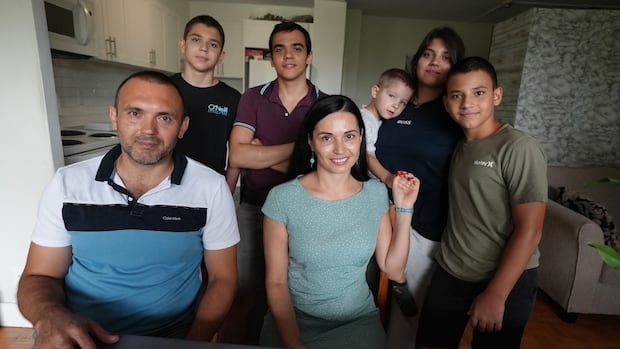More than three years after fleeing a war zone and planting roots in Canada, Ihor Berezovskyi says his family’s future remains uncertain.
He and his family are among the 300,000 Ukrainians who arrived in Canada after Russia launched its invasion on Feb. 24, 2022. Ottawa offered them temporary resident status, which ended this past March.
Despite staying on top of their paperwork and applying for permanent residency nearly two years ago, Berezovskyi says their status remains uncertain. He says they also haven’t had any correspondence about their kids’ temporary status extensions.
“We can’t buy our own home because we have to pay additional taxes since we aren’t permanent residents,” Berezovskyi said.
Berezovskyi said his four children and grandchild are also not currently covered under OHIP and his two older children, who are ready to apply for university, don’t qualify as domestic students, so that’s on hold too.
This weekend, Ukrainian communities across the GTA will be celebrating Ukraine Independence Day. As CBC’s Tyler Cheese reports, many are also contemplating recent comments made by U.S. President Donald Trump about bringing an end to Russia’s war against their home country.
That’s the situation Kyrylo Tykhonenko is also in.
Tykhonenko arrived in Toronto on July 6, 2022 after fleeing from Izyum, Ukraine.
He completed one year at Queen’s University in Kingston on a scholarship, but when his temporary resident status expired, he couldn’t afford the international student fees and had to drop out. He said he applied for permanent residency status nearly two years ago.
“It’s created a big burden on me because I left my friends in Kingston and stopped continuing my education,” he said, adding he is now temporarily living in Winnipeg with his brother.
Thousands of Ukrainians in immigration limbo, consultant says
Thousands of Ukrainians are in the same position, according to one immigration consultant who’s now advocating for the government to fast track the “approved in principle” process of their applications so that they can move on with their lives.
According to the federal government, an application is “approved in principle” when a person has received a letter from Immigration, Refugees and Citizenship Canada (IRCC) stating that they meet the permanent residency eligibility requirements, but they still have to pass the medical, security and background checks.
“I would like to ask on behalf of all the families, that this stage be provided as soon as possible,” said Evelina Shatilova, an immigration consultant.
“The war is still ongoing, the families cannot go back there,” she said.
The IRCC says Canada remains committed to supporting Ukrainians and their family members by providing a temporary safe haven as the war in Ukraine continues.
But with thousands of Ukrainians living and working in Canada for over three years, many say they hope to live here permanently. The IRCC says Ukrainians who wish to immigrate permanently can apply through existing immigration programs and streams, but Shatilova said the processing times on the government’s website continue to grow.
“I would say as of November 2023, that’s when we noticed that these applications seem as if they are on pause,” she said.
Federal government responds
In a statement, Jeffrey MacDonald, a spokesperson for the IRCC, says while most of the Canada-Ukraine Authorization for Emergency Travel (CUAET) program measures have ended, the government has extended some temporary in-Canada measures to allow Ukrainians and their family members who arrived in Canada under CUAET to continue to work and study here while the conflict in Ukraine continues.
The IRCC says Ukrainians can apply for a new open work permit that is valid for up to three years, renew a current open work permit or apply for a new study permit, subject to standard fees.
“If they apply before the expiry date, they can continue working or studying with maintained status until we make a decision on their application,” MacDonald said in the statement.
The IRCC did not answer questions about whether there is a backlog on processing the applications.
Berezovskyi’s wife Svitlana Berezovska says her love for Canada runs deep.
Her hope is that her family can stay permanently, and she can give back to the communities that welcomed them.
“Three Canadian families helped us when we came here,” she said. “I have met only good people here and I’d like to give back.”







